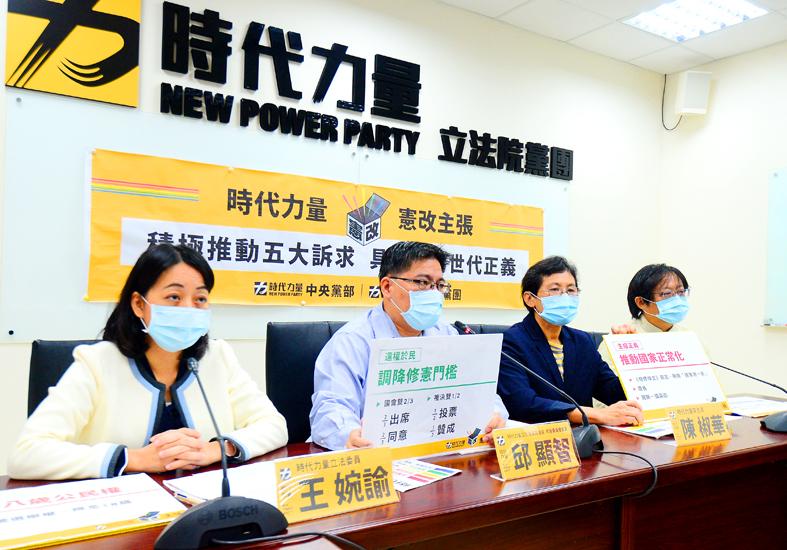The New Power Party (NPP) yesterday reiterated its support for lowering the voting age to 18, as well as abolishing the Control Yuan and Examination Yuan through a constitutional amendment, adding that it would achieve intergenerational justice and to solidify Taiwan’s status as a normal nation.
The Legislative Yuan has formed a Constitutional Amendment Committee which is scheduled to begin its deliberations during the next legislative session and NPP Legislator Chiu Hsien-chih (邱顯智), who represents the party on the committee, said at a news conference that it has always been the party’s policy to abolish the Control and Examination yuans.
A democratic nation should be run by the executive, legislative and judicial branches of the government, with legislators having the right to oversee the executive branch, Chiu said.
The executive branch should hold the examinations to recruit civil servants, he said, adding that agencies under the two branches should be placed under the Legislative Yuan or Executive Yuan after the two institutions are abolished.
The Ministry of Examination and the Ministry of Civil Service should remain independent agencies under the Executive Yuan, while the National Human Rights Commission should be under the Presidential Office, Chiu said.
The right to impeach the president and government officials should be returned to the Legislative Yuan, while the National Audit Office should be an independent agency under the legislature, he said.
NPP Legislator Claire Wang (王婉諭) said that the party has been proposing lowering the voting age to 18 since 2016 as it is a trend in democratic nations.
“We are glad to see political parties in Taiwan have gradually reached a consensus on issues related to the voting age over the years and we would certainly support a constitutional amendment to ensure that it happens,” Wang said. “Our party proposes that the minimum age to vote and run in elections be set at 18, as it would safeguard the rights of young people to participate in politics and achieve intergenerational justice.”
It has become increasingly important to guarantee young people’s right to a voice as the nation transitions to an ultra-aging society, and a proposal to lower the age of majority in the Civil Code from 20 to 18 has already passed a preliminary review at the legislature, she said.
The citizenship of young people would be thoroughly realized through such a constitutional amendment, she added.
However, at least three-quarters of all legislators must be present to vote on a proposal for a constitutional amendment, which would only pass if it secures the consent of three-quarters of the legislators present, the NPP said, adding that the thresholds are too high.
An amendment should make it easier for people to propose changes to the Constitution, it said, adding that it should require only two-thirds of legislators to vote and the amendment should pass if it secures the approval of two-thirds of the legislators present.
When an amendment to the Constitution is put to vote in a general election, the standards by which it can pass should also be changed, the NPP said.
A constitutional amendment currently has to secure the consent of 50 percent of eligible voters, but the NPP is proposing that it should pass if at least 50 percent of eligible voters participate and 50 percent of those agree to the amendment.
Another constitutional amendment is needed to solidify the nation’s status by completely abolishing the Taiwan Provincial Government and eliminating wording related to unification with China, the NPP said.
Through the amendment, the party also hopes to change the legislative election process from a parallel voting system to a mixed-member proportional representation system.
That would ensure that legislative seats would be distributed based on the percentage of votes a party receives, ensuring that smaller parties still have a voice, the NPP said.
The threshold to be allocated legislator-at-large seats should be reduced from 5 percent of the total vote to 3 percent, it said.
Source: Taipei Times - 2020/12/02





















